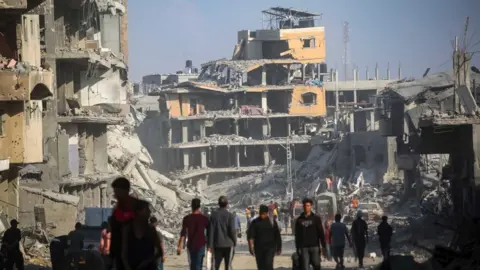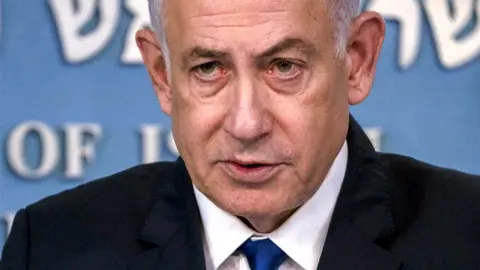Jeremy Bowen: Iran’s attack on Israel offers Netanyahu a lifeline
It wasn’t many days ago that Israel’s Prime Minister Benjamin Netanyahu was under enormous pressure.
After seven aid workers from World Central Kitchen were killed by the Israeli army in Gaza on 1 April, US President Joe Biden seemed finally to lose patience with his troublesome ally.
On the same day, Israel attacked the Iranian diplomatic compound in Damascus, killing a senior general, at least six other officers, and violating legal conventions that prohibit attacks on embassies.
Israel claimed, unconvincingly, that Iran had forfeited that protection by turning the consular building it destroyed into a military outpost. Iran promised it would retaliate, but previous attacks on senior commanders had generated more words than actions.
Outside Iran, the attack on Damascus was overshadowed by the fury caused by the killing of the team from World Central Kitchen, a US-based charity.
The White House issued a furious statement from President Biden. He was “outraged and heartbroken”. It was not a standalone incident. Israel was not doing enough to protect aid workers or Palestinian civilians.
In an angry call with the prime minister, he demanded major concessions. Gaza should be flooded with humanitarian aid. Israel must open more border crossings, as well as the container port in Ashdod, less than an hour’s drive away from children starving to death in northern Gaza.
 Getty Images
Getty ImagesPrime Minister Netanyahu promised that things would change. Despite that, Israel was stalling.
As well as feeling the heat from the White House, Mr Netanyahu was also under pressure from the ultranationalist extremists whose backing in Israel’s parliament keeps his coalition in power. Not only are they opposed to flooding Gaza with aid. They believe the war has presented Israel with a priceless opportunity to re-settle Jews in Gaza. Jewish settlements there were evacuated and demolished by Israel in 2005 as part of a unilateral withdrawal from the territory.
By the end of last week, the US was increasing the pressure. On Thursday, Samantha Power, the top US humanitarian official, said it was “credible” that famine was already affecting parts of Gaza.
It was apparent to Israel’s friends as well as its enemies that its six-month siege of Gaza had created the world’s most urgent food crisis. There was another burst of speculation that the US would put conditions on the use of the weapons it supplies to Israel.
On Saturday morning, hours before the Iranian attack on Israel, The New York Times echoed deepening outrage, especially among prominent Democrats in the US Congress. It called for a pause in the supply of weapons to Israel and laid into Benjamin Netanyahu.
Under the headline, Military Aid to Israel Cannot Be Unconditional, the paper’s editorial board slammed Mr Netanyahu and the hardliners in his government for breaking “the bond of trust” with America. The US commitment to Israel, and its right to defend itself, did not mean that President Biden “should allow Mr. Netanyahu to keep playing his cynical double games”, it said.
Then Iran’s first-ever direct attack on Israel offered the prime minister a lifeline.

In a remarkable feat of military co-operation, the US and other Western allies helped Israel shoot down more than 300 drones and missiles launched by Iran. No Arab leader has been a sterner critic of Israel’s war in Gaza than King Abdullah of Jordan. But Jordan’s air force joined the operation, downing projectiles heading for Israel.
Calls for putting conditions on military aid to Israel were replaced by resounding expressions of solidarity.
Prime Minister Netanyahu has been presented with new political opportunities. Gaza is out of the headlines, for a day or two at least.
But pressure on the prime minister has changed. It has not gone. Israel’s next moves might redouble it.
President Biden has made it very clear what he thinks should happen next. Israel should declare victory in this episode, “take the win”, and not hit back. He declared, again, that America’s support for Israel was “ironclad”.
That fitted in to his consistent policy since the Hamas attacks on 7 October. The president and his administration have worked hard to stop a wider, all-out war in the Middle East, even as they funnelled massive supplies of arms to Israel that have been used to devastating and deadly effect in Gaza.
Since October Israel has accepted the weapons and the diplomatic support that accompanied them and ignored Joe Biden’s increasingly desperate and angry calls to respect the laws of war and protect civilians.
Just a few days after unprecedented military co-operation from its allies against Iran, Israel looks once again to be bent on ignoring not just Joe Biden’s advice not to retaliate, but very similar sentiments from the other countries that helped out on Saturday night.
Just like Joe Biden, Prime Minister Rishi Sunak in Britain and President Emmanuel Macron in France deployed combat aircraft, both condemned Iran, and both have urged Israel not to hit back.
 Israeli government handout
Israeli government handoutThey are coming up against long-held beliefs and instincts in Israel. One is the deep conviction that Israel’s survival depends on responding to attacks with overwhelming force.
Another is Benjamin Netanyahu’s view, expressed many times over his years in power, that Iran is Israel’s most dangerous enemy, bent on the destruction of the Jewish state. Many Israelis share that view.
Now, after years of hostility since the Islamic Revolution in 1979, Iran has for the first time mounted a direct attack on Israel. A long clandestine war has come out of the shadows.
Israel has said the question is not whether it will return, but when and how. The war cabinet has been debating how to do it without igniting an all-out war. In the end, though, any attack will gamble that Iran does not want an all-out war either, and will respond accordingly. That is a dangerous assumption. Both sides have already badly misjudged the other’s intentions.
Once again, Benjamin Netanyahu and his government are bent on ignoring the wishes of allies who have gone the extra mile to help Israel against its enemies. His ultranationalist allies are demanding a crushing attack on Iran. One of them said Israel should “go berserk”.
At the same time the humanitarian catastrophe continues in Gaza. International attention has swung away from it but will return. Israel’s military is still operating in Gaza and still killing civilians. Deadly violence between Palestinians and Jewish settlers in the West Bank has surged again. Israel’s border war with Hezbollah could escalate fast.
Iran has vowed to retaliate more strongly if Israel attacks. The chief of staff of its armed forces, Hossein Baqeri, said the attack on Israel had been “limited” and promised a “far greater” response if Israel retaliated.
The Americans have said they will not assist if Israel attacks Iran. But it is hard to believe that Joe Biden’s definition of an “ironclad” commitment to Israel’s security would keep the US on the sidelines if Iran answered an Israeli attack with another of its own.
The slide continues towards a wider war in the Middle East and a deeper global crisis.



